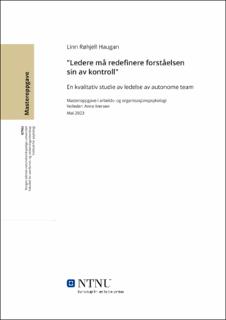"Ledere må redefinere forståelsen sin av kontroll". En kvalitativ studie av ledelse av autonome team.
Master thesis
Permanent lenke
https://hdl.handle.net/11250/3076889Utgivelsesdato
2023Metadata
Vis full innførselSamlinger
- Institutt for psykologi [3140]
Sammendrag
For å imøtekomme kravene som stilles i et arbeidsliv preget av høy endringstakt og mer komplekse og sammensatte problemstillinger, tenderer flere bedrifter mot å skifte ut hierarkiske strukturer og byråkratisk organisering med større vektlegging av autonomi og selvorganiserte team (Hoda, 2011). Ledere spiller en viktig, og muligens underkommunisert, rolle i autonome team. Som følge av flatere organisasjonsstruktur gjennom desentralisering av beslutningsmyndighet og distribuert ansvar, kreves en annen type ledelse enn hierarkisk og toppstyrt ledelse. Det er imidlertid lite kunnskap om slike lederes praksis, og hvordan de balanserer lederparadokset om å ha kontroll, samtidig som de slipper kontroll. For å adressere dette hullet i litteraturen, har studien undersøkt følgende problemstilling: «Hva gjør de som lykkes med ledelse av autonome team?». Utvalget består av seks ledere innen offentlig og privat sektor i organisasjoner som anvender autonome team i strukturering av arbeid. Intervjuene ble analysert ved bruk av refleksiv tematisk analyse med en overordnet induktiv tilnærming. Funn fra analysen gir indikasjoner på at ledere redefinerer forståelsen sin av hvilke aspekter av teamets arbeid de kan og bør etterstrebe å ha kontroll over, og hvilke de ikke bør etterstrebe å ha kontroll over. Basert på dette vektlegger de viktigheten av å ha kontroll over målprosessen til teamet, samtidig som man «slipper» kontroll over menneskene. Funn fra dette forskningsprosjektet gir indikasjoner for hvilke aspekter av autonome team ledere bør bevare kontroll over, og hvilke de bør slippe kontroll over, ved hjelp av ulike lederatferder. Studien tilbyr dermed et bidrag til «både-og» tilnærmingen til ledelse av autonome team. To meet the demands of a rapidly changing and increasingly complex work environment, several companies are opting to replace hierarchical structures and bureaucratic organization, with a greater emphasis on autonomy and self-organized teams (Hoda, 2011). The role of leaders in autonomous teams is vital, yet often overlooked. Due to a more horizontal organizational structure resulting from decentralized decision-making authority and distributed responsibility, a different style of leadership is required compared to traditional hierarchical and top-down approaches. However, there is a lack of understanding regarding the managerial practices that enable leaders to navigate the paradox of maintaining control while also relinquishing it. To address this research gap, the study investigates the following research question: "What do the leaders who succeed in managing autonomous teams do?". The sample comprises six managers from both the public and private sectors, representing organizations that utilize autonomous teams as a means of structuring work. Reflexive thematic analysis with an inductive approach was employed to analyze the interview data. The findings indicate that these managers redefine their conception of control by determining which aspects of the team's work they should retain control over and which aspects they should let go of. They emphasize the importance of maintaining control over the team's goal-setting processes while simultaneously relinquishing control over individual team members. These insights shed light on the specific aspects of autonomous team leadership that necessitate control and those that benefit from autonomy, employing various leader behaviors. Thus, this study contributes to the “both-and” approach to leading autonomous teams by offering valuable insights into effective managerial practices within these contexts.
